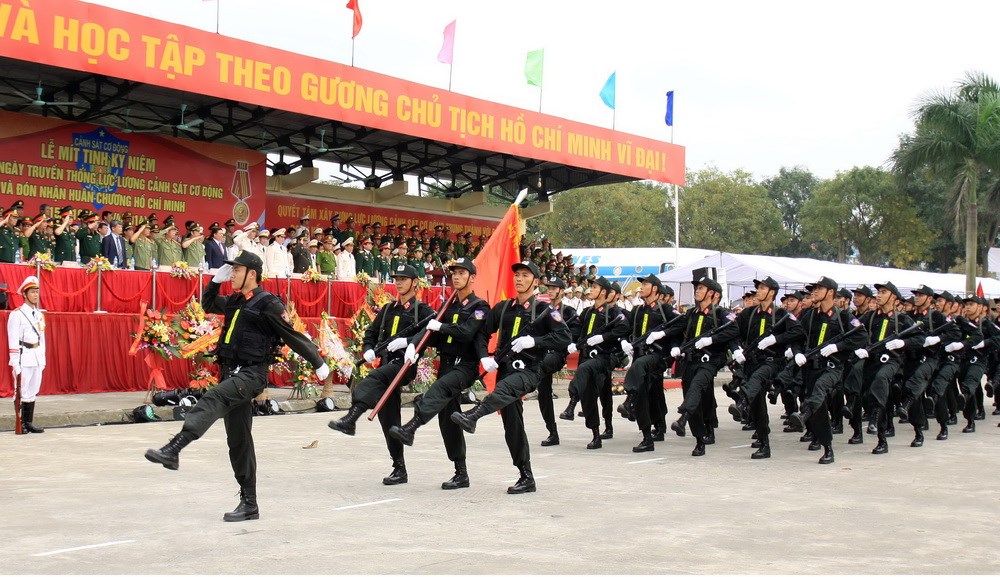From January 1, 2023, 4 Laws take effect, including: Insurance Business Law; Mobile Police Law; Law on Intellectual Property amended and supplemented; Cinema Law.

Create conditions for insurance companies to actively develop products
Law on Insurance Business No. 08/2022/QH15 passed on June 16, 2022, at the third session of the 15th National Assembly. The law takes effect from January 1, 2023.
With 07 chapters, 157 articles, the Law on Insurance Business has changed the method of financial management, business management to allow capital to be determined and business management according to the specific risks of each enterprise, not equal as before.
Since then, create conditions for businesses with good financial situation and healthy governance to develop; promptly correct businesses with poor financial management and risk management. The market is more transparent due to clear regulations on information disclosure.
The Law on Insurance Business also provides regulations to create initiative in business activities, encouraging the application of information technology and minimizing administrative procedures, strengthening the initiative for enterprises in the development of insurance products.
Foreign investors may contribute capital up to 100% of the charter capital
In order to actively implement international commitments, the Law on Insurance Business has added regulations on the establishment of branches of foreign reinsurers in Vietnam.
The Law on Insurance Business also added regulations affirming that foreign investors can own shares and contributed capital up to 100% of charter capital of insurance and reinsurance enterprises in order to create clarity and conformity with Vietnam's commitments at the WTO and signed free trade agreements.
In order to ensure consistency and synchronization with the relevant legal system, the Law on Insurance Business has also made amendments and supplements related to insurance contracts; enterprise registration.
In particular, in order to ensure consistency with the Civil Code and make it easy to apply in reality, the insurance contract is amended and supplemented with regulations on cancellation of insurance contracts, invalid contracts, unilateral termination of contract performance; deregulation of the statute of limitations for initiating lawsuits, the time when the liability of the contract arises, etc.
Clearly classifies the types of insurance contracts corresponding to the types of insurance; specifies the subjects to be insured, the benefits to be insured for each type of insurance contracts; improves the responsibilities of the subjects participating in the insurance contracts in providing information.
In addition, it also adds regulations on the principles of entering into and performing insurance contracts; the right to agree to enter into many types of insurance contracts; additional time to consider participating in life insurance, etc. to ensure the right to self-agree between the parties in entering into insurance contracts.

Reduce administrative procedures; increase the protection of the rights and interests of insurance buyers
In order to comply with reality and solve problems in the past time, the Law on Insurance Business also has amendments towards abolishing some compulsory insurances such as civil liability insurance of air carriers with passengers; professional liability insurance for legal consulting activities; professional liability insurance of insurance brokerage enterprises.
The Law on Insurance Business amends and supplements the conditions for licensing establishment and operation in order to attract more new investors in the direction of allowing financial and insurance corporations to establish insurance enterprises in Vietnam.
At the same time, it supplements regulations on internal control, internal audit, risk management in accordance with international practices, in accordance with the nature of insurance business to ensure legal compliance, prevention, detection, control and mitigation of risks of insurance enterprises.
Allow insurance companies to take the initiative in designing and building insurance products
Regarding professional activities, the Law on Insurance Business stipulates that insurance enterprises are allowed to take the initiative in designing and building insurance products and only have to register with the Ministry of Finance the method and basis for calculating life insurance, health insurance, motor vehicle insurance (except compulsory insurance); supplementing regulations on outsourcing activities.
In order to reduce administrative procedures, the Law on Insurance Business shall abolish the requirement to approve the closing, opening and changing of the location of branches and representative offices and replace it with a notification to the Ministry of Finance before the change occurs.
The Law on Insurance Business additionally stipulates the organizational and management structure of the insurance enterprise, the manager and the controller of the insurance enterprise; principles of assignment and holding of positions in order to avoid multiple concurrent duties, dismissal, suspension, and temporary suspension of the title of Chairman of the Board of Members/Chairman of the Board of Directors, General Director/Director , actuaries to protect the rights and interests of the insurance buyer.
Supplement regulations on financial security
The Law on Insurance Business also adds regulations on financial safety, in case the capital adequacy ratio is at a level that requires intervention, early improvement measures, control measures, regulations on responsibilities of enterprises, owners, capital contributors, Board of Directors, Supervisory Board, etc.
It also supplements requirements for periodic disclosure of information, regular disclosure of information; publicizing unusual information to ensure clear and transparent information about insurance enterprises.
At the same time, supplements principles, requirements, subjects and forms of providing insurance services and products in the network environment to match the trend of the fourth industrial revolution.

The main task of the Mobile Police is " the use of armed means mainly to combat rioting and terrorist acts".
Effective from January 1, 2023, the Mobile Police Law consists of 5 Chapter 33 Articles regulating the position, functions, tasks, powers, organization and operation of the Mobile Police; guarantee conditions, regimes, and policies; state management and responsibilities of relevant agencies, organizations and individuals for the Mobile Police.
In particular, the Law continues to affirm and clarify the function of the Mobile police in doing "the core of implementing armed measures to protect national security, ensure social order and safety";
The Mobile Police Law specifies the tasks and powers of the Mobile Police, defining the main task of the Mobile Police as "the use of armed means mainly to combat rioting and terrorist acts".
Many new points about the organization of the Mobile police force
In addition, the Mobile Police Law also has many new points on the organization of mobile police forces, such as the addition of cavalry forces, People's Public Security air force regiments,etc.
The law also adds some authority to the mobile police force, such as being allowed to prevent and disable unmanned aerial vehicle and ultralight flying equipment, and to mobilize people, vehicles and civil equipment in case of emergency.
The Mobile police law is a complete legal basis for the mobile police force to perform the task of ensuring security and order, preventing crimes and law violations more effectively.
Notably, Vietnamese citizens aged 18 years or older, regardless of male or female, have political, moral, health, and background qualities to meet the prescribed standards and voluntarily serve in the Mobile Police; possessing a degree, certificate of technical expertise, professional skills or having skills suitable to the task requirements of the Mobile Police is one of the conditions and criteria for selecting citizens into the Mobile Police.

7 major policies, the most basic and important new points in the Law on Intellectual Property that is amended and supplemented with some articles
The amended Intellectual Property Law was passed by the 15th National Assembly on the 3rd session, June 16, 2022.
The law takes effect from January 1, 2023, except that the regulation on trademark protection is a sound sign that takes effect from January 14, 2022, while the regulation on protection of experimental data for agricultural chemical products takes effect from January 14, 2024.
The revision of the Intellectual Property Law focuses on seven major policy groups, including:
Policy 1: Ensure clear regulations on authors, copyright owners, performers, owners of related rights in the cases of assignments and transfer of Copyright (QTG), Rights related to copyright (QLQ).
- The regulations related to the identification of the owner of the property rights (owner, author, performer) are clearer and more specific, making the process of transfer of ownership and use rights in transfer contracts, transfer of QTG, QLQ more convenient.
- The highlight of the draft Law is the provision that allows the transfer of certain moral rights under the agreement (naming agreement, modification of works) in accordance with the characteristics of the field of copyright in order to solve the problems that exist in the practice of the past time such as cases where there is a need to change the name of the work, modify or upgrade the computer program, etc.
Policy 2: Encourage the creation, exploitation and dissemination of inventions, industrial designs, layout designs, plant varieties created from science and technology tasks using the State budget.
The law stipulates the right to grant patent registration, industrial designs, layout designs, plant varieties as a result of scientific and technological tasks using the state budget to the presiding organization automatically and without reimbursement, and at the same time has a mechanism for reasonable division of interests between the State, the presiding agency and the author in accordance with the spirit of Resolution No. 20-NQ/TW of the 6th Conference of the 11th Central Committee Party.
This regulation not only overcomes current inadequacies in the registration and exploitation of intellectual property rights objects invested by the state, but also is a boost to encourage subjects studying scientific and technological tasks to actively register and exploit inventions, industrial designs, layout designs, plant varieties created; promote cooperation with enterprises to transfer technology, commercialize and attract many investment capital sources for development and product research, thereby reaping many economic benefits as well as achieving social security goals.
Policy 3: Facilitate the process of implementing procedures for registration of QTG, QTP, and procedures for establishing industrial property rights.
Accordingly, whether the right is established automatically without registration (in the field of QTG, QLQ) or must be registered (in the field of industrial property), the regulations related to procedures, time limits, components of the dossier,etc. continue to be completed in a compact, fast, convenient and transparent manner to encourage and increase the registration and establishment of intellectual property rights in order to create a basis and solid evidence in the determination of right holders and protected objects, as a premise for the exploitation of rights as well as the enforcement of rights in the future.
Some specific amendments include: creating a legal basis for organizations and individuals to make online registration of QTG and QLQ; decentralizing third party opinions to speed up the application appraisal process; simplifying the industrial design description; limiting the security control for inventions; allowing to delay the publication of industrial design applications; supplementing some specific regulations on complaint settlement procedures in the field of science and technology.

Policy 4: Ensure a satisfactory and balanced level of protection for intellectual property rights.
Accordingly, the provisions related to the protection and enforcement of intellectual property rights are amended and perfected to ensure an adequate and balanced level of protection between the rights of the right holder and the right to use, access to knowledge and technology of the society. Details are as follows:
- Supplementing a number of exceptions that do not infringe on the QTG, QLQ, the limits of the QTG, QLQ in order to ensure the harmony of interests between the copyright holder and the organizations and individuals exploiting, using the works and the public enjoying access to the works, ensuring the implementation of international commitments and in accordance with practical conditions of Vietnam.
- Supplementing a number of regulations to control inventions using genetic resources and traditional knowledge of genetic resources; supplementing a number of grounds to terminate the validity and invalidation of protection certificates (patents, trademarks); handling conflicts between trademarks and plant names, with subjects of QTG, QLQ; amending the regulations on subjects for geographical indications; clarifying the conditions considered to be unfair competition between domain names and previous trademarks, trade names and geographical indications.
Policy 5: Enhance the effectiveness of intellectual property support activities.
The amended contents aim to promote supporting activities for the intellectual property system (including representative and assessment activities), specifically amending and supplementing some regulations in a more open direction in order to create competitiveness in the provision of representative services (dividing the representatives by field; loosening the conditions for grant of representative practice certificates depending on the field); amending regulations on accessment in the direction of clearly defining the scope between intellectual property accessment and judicial accessment on intellectual property; clarifying the evidential meaning of intellectual property assessment conclusions);
Policy 6: Improve the effectiveness of intellectual property rights protection activities.
Provisions related to the enforcement of the right to be amended to ensure that the protection mechanism for intellectual property rights is more effective, reasonable and feasible, notably the provision of additional authority to proactively apply control measures at the border if, during the course of inspection, supervision and control, the customs authority finds clear grounds to suspect that the imported or exported goods are counterfeit intellectual property goods.
Policy 7: Ensure the full and serious implementation of Vietnam's international commitments on the protection of intellectual property in the integration process.
- Amending and supplementing a number of contents related to technology measures to protect rights and rights management information to ensure enforcement in the digital environment; some provisions on the exception of QTG and QLQ;
- Amending and supplementing a number of contents related to the protection of sound trademarks; terminating the validity of protection certificates for trademarks; mechanisms to ensure information for patent holders to exercise rights in market circulation licensing procedures for pharmaceuticals; obligations to protect confidential data in applications for agricultural chemical product licenses; mechanisms to compensate patent owners for delays in the issuance of pharmaceuticals; assumptions on QTG, QLQ; rights and responsibilities of intermediary service providers in the Internet and telecommunications networks; the obligation to actively suspend customs procedures for export and import goods suspected of being counterfeit intellectual property.

10 Basic New Points Noteworthy Cinema Law (Revised)
Cinema Law No. 05/2022/QH15 (abbreviated as Cinema Law 2022) inherits, corrects, amends and supplements 32 articles, 18 new regulations compared to the Cinema Law 2006. The Cinema Law 2022 takes effect from January 1, 2023 and has 10 new points basically in accordance with the requirements of reality.
Modification and supplementation of the concept of "Film"
Firstly, in terms of concepts, the new Law has inherited, amended and supplemented the terminology concepts stipulated in the Cinema Law 2006 and added the terms "Film Industry", "Film Classification", "Vietnamese Film", "Film Studio" and "Public Cinema Venue". In particular, the amendment and supplementation of the concept of "Film" plays an important role, thereby clearly defining what types of products in the field of audiovisual is regulated by the Cinema Law.
Encouragement of the enhancement and socialization of cinematic activities
Secondly, on the State's policies on cinema and film industry development (Article 5): The Cinema Law 2022 stipulates the investment and support in a clause (Clause 2, Article 5) in order to create flexibility in the State's policies on cinematographic activities; The Law has more clearly shown the mechanism and measures of the State to mobilize all resources for investment and development of cinema and film industry; rearranged according to the policy group to ensure logic, in accordance with the provisions of the law on investment, the State budget and at the same time encouraged the enhancement and socialization of cinematic activities.
Regulations on more detailed and specific the content and behavior prohibited in cinematographic activities
Thirdly, on the contents and acts prohibited in cinematographic activities (Article 9), the Law provides in more detail and more specifically the contents and acts prohibited in cinematographic activities to facilitate the observance of the Law.
Film production using the state budget is carried out in three forms
Fourthly, on film production (Chapter II), important new points are stipulated in the Law including: Providing services using cinematography in Vietnam (Article 13), the Law stipulates that the dossier of application for a license only requires a short script and a detailed script of the content shot in Vietnam instead of the full script as prescribed in the Cinema Law 2006.
In addition, film production using the state budget (Article 14) is carried out in three forms of assignment, ordering or bidding other than the Cinema Law 2006 which only stipulates the form of bidding. The Law also expands the subjects of film production investors using the state budget to be ministries, ministerial-level agencies, government-attached agencies, political organizations, socio-political-professional organizations at the central level and People's Committees of provinces and centrally-run cities.
New regulations on preferential treatment for foreign organizations using Vietnamese film production services
Fifthly, on the preferential regime for foreign organizations using Vietnamese film production services (Article 41), this is a completely new content prescribed in the Law in order to contribute to improving the professionalism of film crews, promoting the image of the country and people of Vietnam, promoting the development of cinema, tourism and related service industries. This is experience from a number of countries in the region and the world that have also applied this preferential policy to attract foreign organizations to use film production services.
The law does not stipulate that film distribution is a conditional business.
Sixthly, regarding film distribution (Chapter III), the Law does not stipulate that film distribution is a conditional business in order to facilitate investment and business in the field of film distribution.

Regulations on age classification and display of movie classification levels, movie content warnings
Seventhly, on film dissemination (Chapter IV), Dissemination in cyberspace (Article 21), the Law clearly stipulates the subjects allowed to disseminate films in cyberspace, and at the same time stipulates more requirements and conditions to be ensured when disseminating films in cyberspace such as meeting the conditions for classifying films according to the Government's regulations, announcing the list of films to be disseminated and the results of film classification to the Ministry of Culture, Sports and Tourism before making film dissemination on cyberspace. Take necessary technical measures and guide the parents or guardians of children to self-control, manage and ensure that children watching films are disseminated on cyberspace in accordance with their age, provide clues, contact information to receive and handle requests of state management agencies; feedback, complaints and denunciations of service users.
Regarding the granting of film classification licenses, film appraisal and classification (Article 27 and Article 31), the Law stipulates decentralization to the provincial People's Committees to grant Film Classification Licenses when meeting the regulations of the Ministry of Culture , Sports and Tourism. The content of decentralization is not entirely new in the law, but the new regulation is more feasible to meet the actual conditions than the provisions of the Cinema Law 2006.
Regarding the classification of films (Article 32), Vietnamese films screened at cinemas have been classified by age since 2017. However, this provision only applies to movies screened at the theaters and is only stipulated in the Circular. The Cinema Law 2022 stipulates the age classification and display of movie classification levels, warning film content that generally applies to films shown in all popular forms.
Copyright deposit period for imported films is based on the copyright term that is popular in Vietnam
Eighthly, regarding film deposit and storage (Chapter V), the technical format of films changed from plastic film to digital films, so the Law adds a number of new regulations to suit film technology such as copyright deposit period for imported films based on the common copyright term in Vietnam, Vietnamese films produced with the state budget must be transferred unencrypted copies, scripts and documents to the film storage facility; Return the deposited film copy to the depositing establishment when the time limit for deposition expires. Movie owners must unlock the film code for comparison and inspection at the request of a competent state agency.
Expanding the subject of the film festival
Ninthly, in terms of film festivals, film awards, film contests, film programs and film weeks in Vietnam (Article 38), compared to the Cinema Law 2006, the Cinema Law 2022 has expanded the subject of the film festival to mobilize social resources to promote and honor domestic cinema. Specifically, ministries, departments, agencies under the Government, provincial People's Committees, socio-political professional organizations may organize their own film festivals, awards, film competitions, film programs, and film weeks in Vietnam. Agencies and organizations not mentioned above are allowed to organize film festivals, film awards, film competitions, film programs and film weeks in Vietnam.
The law has supplemented and clarified the purpose of the Cinema Development Support Fund.
Tenthly, on the Fund for supporting cinema development, compared to the Cinema Law 2006, the Law has supplemented and clarified the purpose of the Fund (Article 44) and the Fund's operating principles (Article 45) to improve feasibility./.
Source: chinhphu.vn